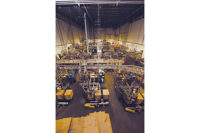
In Conclusion
IDFA applauds finalization of WTO Doha framework.
The International Dairy
Foods Association (IDFA) hails August’s release of the World Trade
Organization’s (WTO) framework for negotiations in the Doha Round.
The text was released following a tough week of
negotiations in Geneva. While broadly written, the framework contains a
number of goals that could significantly affect the U.S. dairy industry.
Among these decisions is to eliminate agricultural export subsides, which
is a top priority for IDFA.
“This framework is a major achievement,”
says Clay Hough, IDFA senior vice president and general counsel.
“U.S. negotiators and WTO members have made a tremendous effort to
further liberalize trade and reduce market distortions that will greatly
benefit U.S. dairy exporters.”
Although the document is often general in its terms and pushes
more difficult decisions to a later date, WTO members did commit to language
to establish a more market-oriented international trading system. In addition
to the elimination of export subsidies, the WTO framework includes provisions
to increase market access and reduce domestic subsidies.
If the framework language remains intact during the
Doha negotiations, several U.S. dairy policies might have to be changed or
ended, including the federal Dairy Price Support Program, the Milk Income
Loss Contract (MILC) payments — both of which are considered
“amber box” domestic subsidies — and the Dairy Export
Incentive Program (DEIP), an export subsidy. But the U.S. dairy industry
would simultaneously benefit from increased opportunities in other markets.
IDFA will continue to be engaged in the WTO Doha Round
as it proceeds and will work with U.S. negotiators to obtain the best
possible outcome to ensure a substantial increase in market access for U.S.
dairy exports and a real reduction in trade-distorting domestic support
subsidies.
A full analysis of the framework’s provisions that may
affect the U.S. dairy industry can be found at www.idfa.org. df
$OMN_arttitle="In Conclusion";?>




